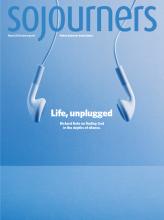IN A CROWDED auditorium [in Honduras after Hurricane Mitch] that served as a shelter for 900 people, the scarce supply of drinking water was kept in a bucket and labeled with a sign that said "Do not use your own cup." Five bored, mischievous children, however, could think of nothing better than to try to stick their cups in the water. Then one relief worker gave them a special assignment. "This water is very important," she said. "I need you to be the guardians of the water so that no one dips in their own glass." And they, feeling respected and needed, became the fierce, undaunted protectors of the water supply.
Similarly, countless Hondurans are saying, "If not us, then who?"—righting their relationship with themselves, assuming the task of rebuilding their homes and communities, recognizing that progress occurs when they participate. Women, who have never even valued their never-ending activity as work, are speaking up when the pay sheets are evaluated. "I planted a garden. I rebuilt the wall of my house. I earned my corn and beans."
Read the Full Article
